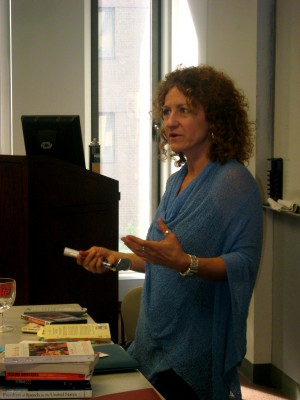Changes to Communications Major Up Pending for State Approval
Associate Chair of Communication and Media Studies Gwenyth Jackaway featured above. (OBSERVER ARCHIVES-Angelica Garza)
August 28, 2015
If changes to Fordham’s Communications major are approved by the New York State Department of Education (NYSED), Lincoln Center will have four new majors under the umbrella of the Communication and Media studies department.
Jacqueline Reich, Ph.D, professor and chair of communication and media studies (CMS), and Gwenyth Jackaway, professor and associate chair of CMS, have spoken to the Observer about these changes.
OBSERVER: Tell us about the four new majors that will be developed.
JACQUELINE REICH AND GWENYTH JACKAWAY: Here are the titles of the four proposed majors. These are pending approval, and as such we cannot call them new majors and minors: Communication and Culture, Digital Technology and Emerging Media, Film and Television, Journalism.
OBSERVER: Will any of these majors come with new minors?
JR & GJ: Yes. All will have minors, plus Sports Journalism will be an additional Journalism minor.
OBSERVER: When will the new majors be available to students?
JR & GJ: Our goal is to have the new majors up and running for Fall 2016. We should have the details solidified by Spring 2016.
OBSERVER: What was the approval process like for the four new majors?
JR & GJ: It was a great deal of work. We did a lot of background research: our Department collected and analyzed multiple data: 1) student surveys on the strengths and weak- nesses of our current program; 2) enrollment data on total majors by concentration, in connection to the major’s growth on all three cam- puses; 3) consultation with Fordham Department Chairs and Arts and Science Deans; and 4) qualitative and quantitative content analysis of the structure, curriculum and program- matic features of regional, peer/ aspirant, and Jesuit Communication and Media Studies programs around the country. Our sample for this study was comprised of 79 schools, yielding data on 124 individual ma- jors. Among the variables examined were: departmental structure, types of majors offered, specific major requirements and theory/practice balance. This study provided us with valuable insight into the ways in which our rapidly transforming discipline is being covered at Universities nation-wide.After it was approved at the departmental level, the Chair presented the proposal to the Deans of the Arts and Sciences. It was then approved by the FCLC and FCRH College Councils, the Majors and Curriculum Committee of the Arts and Science Council, and then the Arts and Science Council.
OBSERVER: What is the theory to practice ratio like?
JR & GJ: We believe that is our responsibility as communication and media educators to provide our students with a solid grounding in theory while simultaneously offering specialized preparations necessary for today’s changing media landscape.
OBSERVER: What fields of work are each of these majors geared towards?
JR & GJ: The proposal is for each proposed major to have its own distinct intro course. In addition,
we have proposed one departmental introductory course that all students majoring in the four new majors will be required to take, as well as an Ethics, Law and Policy requirement.
OBSERVER: Will this change necessitate the creation of any new classes for any of the majors, or will existing course be reorganized?
JR & GJ: Both.
OBSERVER: In the past, certain tracks of the communications major, like journalism for example, have been staffed by mainly adjuncts with few regular professors (especially
at Lincoln Center). Is there a plan
to create more structured depart- ment for each of these tracks if they become separate? What about the use of adjuncts in contrast to professors?
JR & GJ: In the last two years, we have been moving toward an artist- in-residence model: we have one for film and television – Jim Jennewein — and have just hired a digital artist- in-residence, Catherine Katsofouris. With the cooperation of the admin- istration, we hope to hire artists-in- residence in each major who will teach some of the more practical courses in which students learn how to apply theory to practice.
If the modifications are approved, the major will be available to students in 2016.










